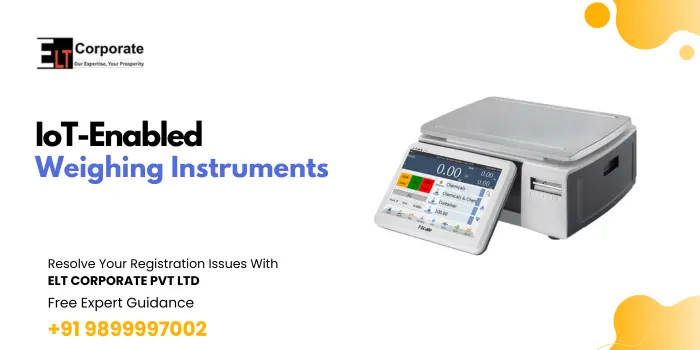The integration of the Internet of Things (IoT) into weighing instruments has completely transformed how industries measure, monitor, and manage weight data.
IoT-enabled weighing instruments are digital weighing systems connected to the internet, allowing real-time data collection, storage, and analysis. These smart devices are widely used in logistics, manufacturing, healthcare, retail, and agriculture, helping improve efficiency, accuracy, and regulatory compliance.
In India, such instruments must comply with the Legal Metrology (General) Rules, 2011, ensuring accuracy and fair trade practices.
What Are IoT-Enabled Weighing Instruments?
IoT-enabled weighing instruments are advanced electronic weighing systems that connect to cloud platforms or networks to record and transmit weight data automatically.
They are equipped with sensors, communication modules (Wi-Fi, Bluetooth, or GSM), and data analytics tools that help industries track weight remotely, automate reports, and reduce human errors.
These systems go beyond traditional scales—they not only measure weight but also:
- Record usage history automatically.
- Send alerts for overloads or calibration needs.
- Integrate with ERP or warehouse management systems.
- Provide predictive maintenance and performance monitoring.
How Do IoT-Enabled Weighing Instruments Work?
IoT-based weighing instruments combine sensors, microcontrollers, and communication modules. The process typically involves:
- Data Collection: Load cells capture the weight data.
- Data Conversion: Microcontrollers convert analog signals into digital readings.
- Connectivity: Devices use Wi-Fi, Bluetooth, or GSM to send data to cloud platforms.
- Storage & Processing: Cloud servers analyze the data and generate reports.
- Access & Control: Users access real-time information through dashboards or mobile apps.
This smart data flow ensures continuous monitoring, instant updates, and improved decision-making.
What Are the Benefits of IoT-Enabled Weighing Instruments?
IoT-enabled weighing instruments offer several benefits for both businesses and consumers:
- Real-Time Monitoring: Instant weight data visibility across multiple sites.
- Error Reduction: Automation minimizes manual data entry errors.
- Efficiency: Speeds up weighing and record-keeping processes.
- Predictive Maintenance: Alerts when calibration or servicing is due.
- Data Integration: Syncs easily with ERP or inventory systems.
- Remote Access: Managers can access weight data from any location.
- Regulatory Compliance: Ensures adherence to Legal Metrology standards for accuracy and reporting.
What Are the Applications of IoT-Enabled Weighing Instruments?
IoT-based weighing systems are widely used across different industries:
- Manufacturing: For process automation and material tracking.
- Retail: For smart checkout systems and accurate billing.
- Healthcare: For patient monitoring and automated medical records.
- Agriculture: To track yields and automate livestock feeding systems.
- Logistics and Transport: To monitor cargo weight during movement.
How Does Legal Metrology Apply to IoT-Enabled Weighing Instruments?
In India, IoT-enabled weighing instruments must comply with the Legal Metrology Act, 2009 and Legal Metrology (General) Rules, 2011.
Manufacturers and importers must ensure:
- The device meets approved model specifications.
- It carries a valid verification stamp.
- It adheres to packaging and labeling standards if sold in pre-packaged form.
- All digital data recorded must maintain accuracy as per Legal Metrology verification standards.
These compliances guarantee consumer protection and maintain trust in digital weighing technologies.
What Are the Challenges in Implementing IoT-Based Weighing Instruments?
While IoT offers many benefits, businesses may face some challenges:
- High Initial Cost: Smart devices and software subscriptions can be costly.
- Data Security Concerns: Internet-connected systems may face hacking risks.
- Integration Complexity: Linking with existing ERP systems may need customization.
- Regulatory Gaps: IoT data standards under Legal Metrology are still evolving.
- Calibration Maintenance: Continuous network calibration must be ensured.
How Is IoT Shaping the Future of Weighing Technology?
IoT is bringing innovation and automation to weighing systems worldwide.
Future developments will include:
- AI-based predictive analytics for weight pattern recognition.
- Blockchain-enabled transparency in trade and logistics weighing.
- Edge computing for faster data processing.
- Sustainability tracking using smart weighing data to reduce waste.
These upgrades will make weighing systems not just accurate but also intelligent, connected, and compliant with both Indian and global standards.
Can IoT-based weighing scales be used for industrial automation?
Absolutely. They are ideal for automated weighing, production tracking, and remote monitoring in manufacturing, logistics, and retail sectors.`
Do IoT-enabled weighing instruments need Legal Metrology approval?
Yes. All weighing instruments sold or used for trade in India must comply with Legal Metrology model approval and verification standards.







